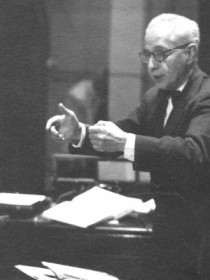 Today, Yiddish music is usually associated with the klezmer genre. But from the early to the middle of the 20th century, Yiddish music was was the basis of a vibrant literary culture. At its center was the Ukrainian-born composer Lazar Weiner (1897-1982). Writing on the occasion of Boston Jewish Music Festival (March 1-11), Jeremy Eichler of the Boston Globe explores Weiner’s largely forgotten legacy:
Today, Yiddish music is usually associated with the klezmer genre. But from the early to the middle of the 20th century, Yiddish music was was the basis of a vibrant literary culture. At its center was the Ukrainian-born composer Lazar Weiner (1897-1982). Writing on the occasion of Boston Jewish Music Festival (March 1-11), Jeremy Eichler of the Boston Globe explores Weiner’s largely forgotten legacy:
While still in his early 20s, Weiner wrote to Joel Engel, a composer and critic who co-founded the Society for Jewish Folk Music in St. Petersburg, a pioneering group that strove to build a national Jewish art music derived from authentic folk sources. With his letter, Weiner enclosed some of his own early songs of a more generically impressionistic character. Engel replied, complimenting their craftsmanship but also wondering why Weiner had neglected all the obvious Jewish material in his own background?
“That was a turning point in his life,’’ said [Weiner’s son, Yehudi] Wyner, one that set him on a new course toward his mature Yiddish art songs. Those songs make frequent if sometimes subtle use of Jewish musical sources while remaining keenly responsive to their poetic texts. (In musical terms, Wyner sees his father’s closest model as the songs of Mussorgsky.) In subject matter, Weiner’s songs address an enormous range of topics, from the plight of a simple wedding musician to the Yiddish language itself (“my golden well’’), from poignant affirmations of faith in a post-Holocaust world, to dissonant existential-religious meditations spurred by the poetry of the 20th-century theologian Abraham Joshua Heschel.
As the Globe puts it, “Taken as a whole, Weiner’s vast and highly diverse catalog of over 100 Yiddish songs – rarely recorded, very seldom performed – represents a deeply eloquent achievement, one that simultaneously bridged artistic worlds, created new hybrid musical forms, and preserved a vision of a secular Yiddish culture across decades of its near-extinction.” Read the whole article here.